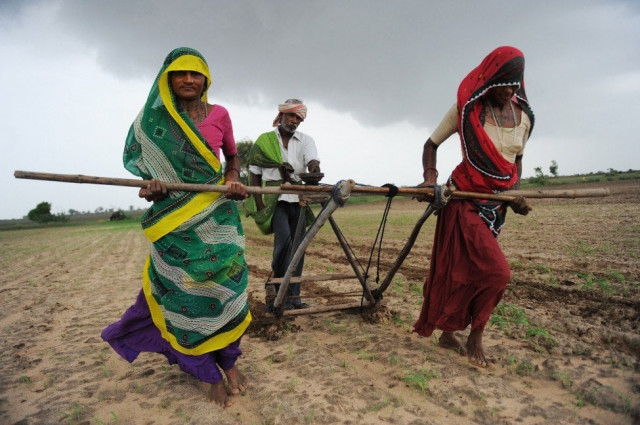‘Lose land or lose lives’: Indian farmers left with hard choices
On eve of World Farmers Day, farm leaders urge government to ensure ‘living income’ to stem farmers’ suicides in India

As India witnessed an uptick in suicides by farmers in the last few years, farm leaders and agriculture experts demanded the government bring in new farm policies and take urgent steps to address the crisis.
Over 17,000 farmers have committed suicide over the past three years due to heavy debts and crop losses, according to figures presented in the Indian parliament earlier this year.
According to a National Crime Records Bureau (NCRB) report, 5,579 farmers committed suicide in the country in 2020, compared to 5,957 the year before.
While 70% of people in the country depend upon agriculture directly or indirectly, the spate of suicides by farmers has been testing the nerves of successive governments.
Read more: Muslim innovator’s magic hands help India’s troubled farmers
On the eve of World Farmers Day, which is observed on different days in different countries, India's top agriculture expert Devinder Sharma told Anadolu Agency that farmers are facing "income disparity."
"If you look at the agriculture sector, it is the only area where produce enters the market without a price tag, and then the market decides the price," he said.
Sharma noted that whatever is happening in India with regard to farm suicides is "universal in design."
"The reason why Indian farmers resort to suicides is that the design puts agriculture into the hand of a few companies," he said. "The farming population everywhere in the world is confronted with income disparity. Unless we are able to address that, I don't think we can fix up the food markets."
'Serious agrarian distress'
Sharma said there is a need to make farming economically viable by providing farmers a guaranteed price for their produce.
"In India, Minimum Support Price (MSP) should be there. It may not be the right kind of price, but it provides assurance. The real freedom of farmers will come when we provide farmers with guaranteed prices," he said.
Stating that the number of suicides in the country is a reflection of the "serious agrarian distress in the country," Sharma said that in absence of proper income, suicides are bound to happen.
"At times, farmers take multiple loans. To bring farmers out of that situation, we have to give them a living income," he said.
Economist Satish Verma of the Centre for Rural Research and Industrial Development, an autonomous research institute in northern India, said that since the income of farmers is "low", they have to depend on both institutional and non-institutional sources for loans.
"As far as institutional sources, there have been announcements about the loan waiver, but the non-institutional sources which are mostly private don't provide any kind of waiver. As loans from non-institutional sources come with high interest rates, farmers are not able to repay their loans," he said.
He said when farmers are not able to pay their loans, they are left with two options only – lose their land or lose their lives.
"I believe that suicides are happening because of non-institutional loans. The government should control these loans. The non-institutional sources of loans have their own mechanism and they take possession of lands of farmers if they are not able to pay the loans," he said.
Law to help farmers
Sukhdev Singh Kokri, a farmer leader, told Anadolu Agency that over the years, farm suicides have increased, adding the government should bring a law on minimum support price to financially support farmers.
Also read: ‘Indian fake media network targeting Sikh farmers’
The minimum support price protects farmers from price shocks in case of a bad crop year.
"Because of the green revolution in the country, the input cost has gone up, with farmers not getting a good price for their produce. A farmer is forced to take loans, mostly from the private commission agents. It becomes a cycle and the farmer gets trapped in it," he said.
He stated that when there would be a good income for farmers, the dependency on loans would become less.
"So the government has a big role to play in introducing minimum support price for farmers and controlling these private money lenders who are giving loans on high interests," said Kokri.
The Indian government has been maintaining that they have adopted several developmental programs, schemes, reforms, and policies that focus on higher incomes for the farmers.
"All these policies and programs are being supported by higher budgetary allocations, non-budgetary financial resources by way of creating Corpus Funds, and supplementary income transfers under PM-KISAN. The latest major intervention includes the ‘Atma Nirbhar Bharat – Agriculture package’ which includes comprehensive market reforms." the government told parliament in November last year.
It added: "The State Governments provide relief to families of farmers who commit suicide. A few State Governments provide relief to families of farmers who commit suicide and as per the information available, relief measures inter-alia includes; ex-gratia relief to the heirs of the deceased farmer, one-time settlement to wipe off loans/ liabilities towards rehabilitation of the family members; and relief provided to the children of the deceased to get free education."
India last year repealed three farm laws after months of protests by farmers who said the new laws would threaten their livelihoods and benefit large corporations and industrialists.
In November, Indian Prime Minister Narendra Modi announced repealing the laws.
The farmers, however, continue to demand a law on minimum support price soon to protect farmers’ interests.



















COMMENTS
Comments are moderated and generally will be posted if they are on-topic and not abusive.
For more information, please see our Comments FAQ